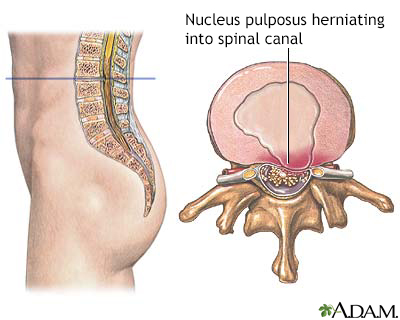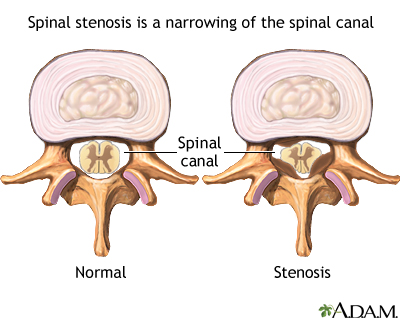| Step 3: Causes of low back pain |
Back pain is frequently associated with muscle strain or spine problems. However there are many other medical reasons that cause back pain, and most patients do not have a clear history of trauma or medical strain. Sometimes it may be the result of an illness.
You may first feel back pain just after you lift a heavy object, move in a sudden, abrupt manner, or suffer an injury (for example, a fall or a car accident).
However, the specific cause of back pain is often never identified. This can be good news, because when the specific cause is easily determined, the problem may be more serious.
Whether identified or not, there are several possible sources of low back pain. The most common are:
- Muscle strain
- Ruptured or herniated disk
- Degeneration of the disks, such as osteoarthritis
- Muscle spasm (very tense muscles that remain contracted)
Other causes include:
- Spinal stenosis (narrowing of the spinal canal)
- Tears to the muscles or ligaments supporting the back
- Small fractures to the spine from osteoporosis
- Other systemic (body-wide) medical conditions. In these cases, back pain is often associated with other symptoms such as prolonged morning stiffness.
Disk degeneration, herniation, and rupture
As you get older, the disks in the spaces between the vertebrae can deteriorate (weaken). This process is similar to arthritis in other joints in the body. The weakening from general wear and tear leads to irritation and inflammation, both of which can cause pain.
If the disk degenerates enough, the area becomes very thin and the jelly-like substance (nucleus pulposus) within the disk can bulge outward. This is called herniation.

There are different degrees of herniation. Many people have slight bulging that causes no symptoms at all. Others have an extensive bulge (called an extrusion), which may cause pain. Even extrusions, however, do not cause pain in everyone. This varies greatly from person to person.
 |
A ruptured disk is a sudden herniation that happens from a serious injury. When a disk herniates for this reason, it is not necessarily related to the wear and tear of age.
Muscle strains and ligament injuries
Muscles and ligaments are important structures that support and strengthen your back. They are located all along the spine, including thick bands surrounding the disk spaces. A strain or actual tear to any one of these muscles or ligaments can cause back pain. Two common areas of such injuries include the thick fibrous band along the side of each disk and the ligaments that connect the spine to the pelvis.
Spinal stenosis
Spinal stenosis is narrowing of the spinal canal, or narrowing of the openings (called neural foramina) where spinal nerves leave the spinal column. This can develop as you age. If you have stenosis, even a minor injury can cause inflammation of the disk and pressure on a nerve. You can feel pain anywhere along your back or leg that this nerve goes to.
Often, you will have pain in the buttock, thigh, or leg that is brought on by activity and relieved by rest. The pain is also relieved by a stooped posture, so that you can walk farther while bending over than standing straight. Pain of this type is virtually specific for spinal stenosis, which is more common in older individuals. This specific problem is also called neurogenic claudication.

Other causes
There are lots of other potential causes of back pain, many of them rare. Some other possible causes are:
- Misalignment of the vertebrae -- for example, one vertebra may slip forward
- Wearing down of the spine bones (as opposed to the disks) of the vertebrae
- Inherited spine abnormalities
|
Review Date:
6/29/2011 Reviewed By: Andrew W. Piasecki, MD, Camden Bone and Joint, LLC, Orthopaedic Surgery/Sports Medicine, Camden, SC. Review provided by VeriMed Healthcare Network. Also reviewed by David Zieve, MD, MHA, Medical Director, A.D.A.M., Inc. |
© 1997- A.D.A.M., a business unit of Ebix, Inc. Any duplication or distribution of the information contained herein is strictly prohibited.
